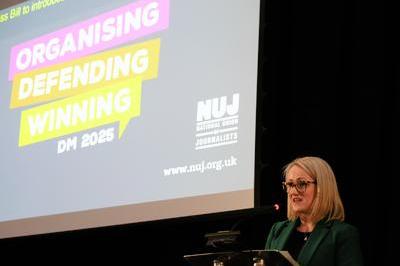Rebecca Long-Bailey MP is welcomed by delegates to DM
The co-chair of the NUJ’s Parliamentary Group updated delegates on the group’s wide-ranging activities.

Rebecca Long-Bailey MP
© Jess Hurd
Long-Bailey thanked the NUJ for the invitation to this year’s Delegate Meeting as she opened her address to members.
The union’s Parliamentary Group has seen good engagement across both Houses of the UK parliament and her co-chair Baroness Jane Bonham-Carter and John McDonnell MP, Group secretary, have been actively involved.
Welcoming Laura Davison, NUJ general secretary, to her post, Long-Bailey said Davison had already been a “formidable force in championing the rights and priorities of members” and looked forward to campaigning efforts with her. She also shared her thanks for the work of outgoing general secretary Michelle Stanistreet for her briefings to MPs and parliamentary Select Committees.
Long-Bailey noted there had been an empowering shift in the landscapes of media production and consumption for the public good taking place, but that this had been marred with misinformation.
She said:
“Misinformation spread by some of the wealthiest and most powerful global actors, compounded with a rapid, and currently weakly regulated adoption of generative AI and escalating global conflict where we have seen the alarming rise in targeting of journalists and media organisations by both individuals and state bodies.”
The Parliamentary Group has affirmed its commitment to campaigning in defence of the rights of journalists both in the UK and internationally. Long-Bailey said: “we must condemn the killing and threatening of media workers and the suppression of truth inherent in such actions.”

© Jess Hurd
The Group has requested meetings with Ministers to discuss how the UK can continue to exert leadership internationally on media freedom. Long-Bailey highlighted that among its calls the group had urged intervention in the case of journalist Frenchie Mae Cumpio imprisoned in the Philippines. She noted in 2024, the number of journalists and media workers imprisoned had increased to 516 from 393 according to records held by the International Federation of Journalists, and that 122 journalists had been killed during the course of their work.
“It is important that we insist that the British government stands up to protect human rights, democracy and freedom of expression at home and overseas, and does not turn a blind eye to the repression of the media anywhere in the world. We must condemn the killing and threatening of media workers and the suppression of truth inherent in such actions.”
On the future of news, she said:
“We need a bold, comprehensive strategy for protecting and investing in the future of local, regional and national news and the Parliamentary Group will continue to look to the NUJ’s refreshed News Media Recovery Plan as an inspirational blueprint for how to do this.”
She referenced the Group’s solidarity with journalists over the recent sale of The Observer to Tortoise Media and highlighted the upcoming renewal of the BBC’s Royal Charter and action taken by the Group to meet Tim Davie, BBC director general on the need for proper public engagement and transparency.
Long-Bailey said “public service funding remains an ongoing concern and some of the proposed approaches to welfare have been incredibly concerning to many.”
On artificial intelligence, the Labour MP for Salford said, “caving into pressure from the big tech multinationals would take us in entirely the wrong direction and the Parliamentary group are monitoring for opportunities to correct the course.”
In concluding her address, she said:
“If we believe in democracy we must protect journalism, if we want to uphold the truth, we must protect journalism, if we want to hold the most powerful to account, we must protect journalism, and ultimately if we want to shape a better world, foster understanding and bridge divides then we must protect journalism.”
